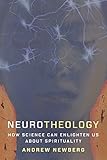Neurotheology : how science can enlighten us about spirituality / Andrew Newberg.
Material type: TextPublication details: New York : Columbia University Press, (c)2018.Description: 1 online resource (321 pages)Content type:
TextPublication details: New York : Columbia University Press, (c)2018.Description: 1 online resource (321 pages)Content type: - text
- computer
- online resource
- 9780231546775
- QP355 .N487 2018
- COPYRIGHT NOT covered - Click this link to request copyright permission: https://lib.ciu.edu/copyright-request-form
| Item type | Current library | Collection | Call number | URL | Status | Date due | Barcode | |
|---|---|---|---|---|---|---|---|---|
 Online Book (LOGIN USING YOUR MY CIU LOGIN AND PASSWORD)
Online Book (LOGIN USING YOUR MY CIU LOGIN AND PASSWORD)
|
G. Allen Fleece Library ONLINE | Non-fiction | QP355.2 (Browse shelf(Opens below)) | Link to resource | Available | on1008770295 |
"With the advent of the modern cognitive neurosciences, along with anthropological and historical research, the scientific study of religious and spiritual phenomena has become far more sophisticated and wide-ranging. It suggests answers as to how and why religion became so prominent in human societies and in human consciousness. Neurotheology--a term coined by Aldous Huxley in 1962 in his novel Island and introduced into the scientific literature in the 1990s by Newberg and others--explores some of the most controversial positions including the argument that religion was a necessary condition of cohesive societies, morality, and a sense of purpose. The book considers brain development from an evolutionary perspective and assesses how religious and spiritual beliefs and experiences arose and whether such evolutionary evidence eliminates the need for a religious explanation. Newberg demonstrates that religious beliefs and emotions can be both beneficial and detrimental in people's lives. For some, religion provides a means toward compassion, openness, and understanding; others turn to highly destructive acts, as is the case with suicide bombers. What is happening in the brains of such people? Are they pathological? And what of practices such as meditation, prayer, and the ingestion of psychoactive substances? Neuroimaging studies can show how these practices affect people in the moment and over a lifetime. Finally, the book investigates the deeper implications of a neurotheological approach. Does the neuroscientific study of religion negate any or all of the truth claims of religion? How does neurotheology address the "big questions" such as: What is the meaning of life? Why are we here? And what is the true nature of reality?"--
Includes bibliographies and index.
Frontmatter -- CONTENTS -- Introduction -- Chapter One. Neurotheology and the Happy Prison of the Brain -- Chapter Two. What Is Neurotheology? -- Chapter Three. Neuroscience and Neurotheology -- Chapter Four. What Is Religion from a Neurotheological Perspective? -- Chapter Five. What Is Spirituality from a Neurotheological Perspective? -- Chapter Six. Neurotheology and the Evolution of Religion -- Chapter Seven. Neurotheology and Psychology -- Chapter Eight. Brain Pathology and Religion -- Chapter Nine. Religious Myths and the Brain -- Chapter Ten. The Ritualizing Brain -- Chapter Eleven. Religious and Spiritual Practices -- Chapter Twelve. The Spiritual But Not Religious Brain -- Chapter Thirteen. Free Will and the Brain -- Chapter Fourteen. Escaping the Prison of the Brain: Mysticism -- Chapter Fifteen. The End of Faith and the Beginning of Neurotheology -- notes -- index
COPYRIGHT NOT covered - Click this link to request copyright permission:
There are no comments on this title.
